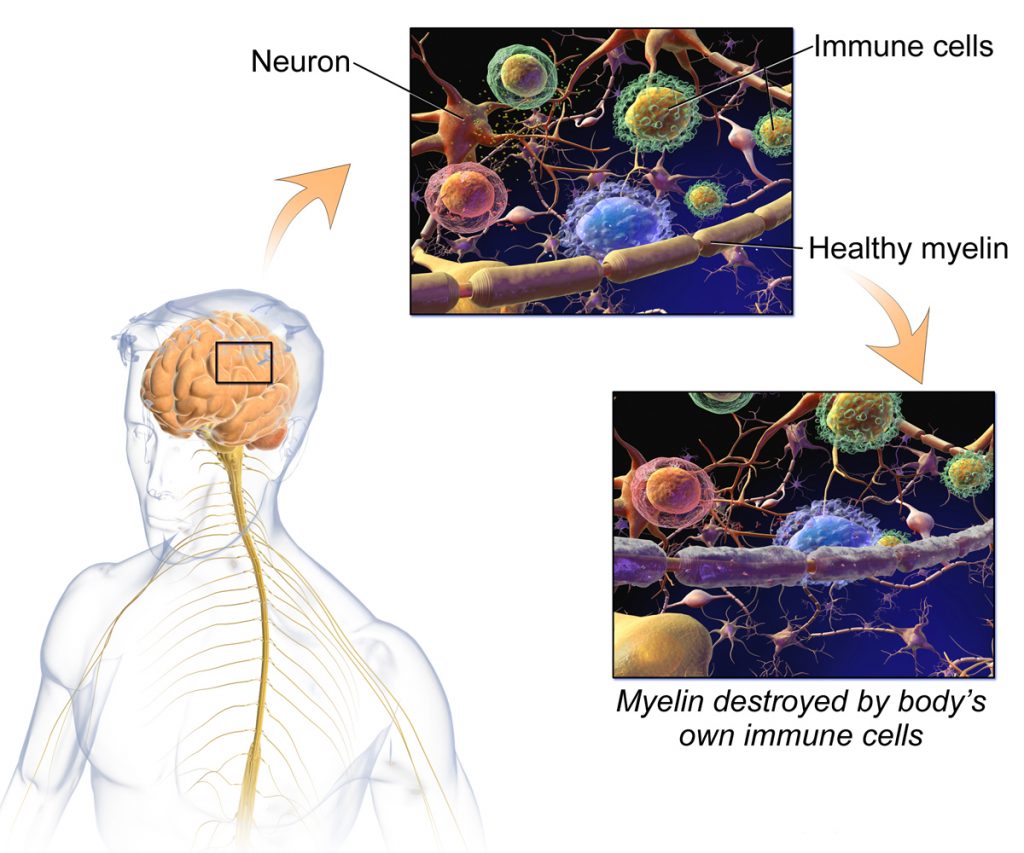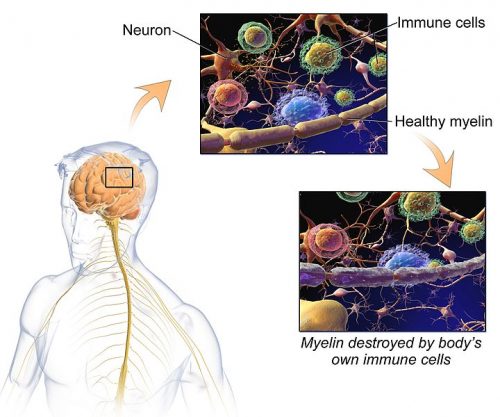What is multiple sclerosis? Multiple Sclerosis or MS is an autoimmune disorder that damages the nerve fibers found in the brain and spinal cord. It causes a wide variety of symptoms and infectious factors as a result of nerve damage and other abnormalities in the nervous system. There is no cure for this chronic disease at the moment. Let’s discuss one of the most prevalent demyelinating diseases that more and more families have suffered from.
MS is a neurological condition that develops when the immune system mistakenly attacks and damages nerve cells, specifically the myelin sheath that protects nerve fibers. This damage can occur in various parts of the brain, including the spinal cord and optic nerves, and can lead to a range of symptoms such as memory problems and sexual function issues. When people develop MS, they may suffer brain cells and nerve fiber damage.
An MRI can help diagnose multiple sclerosis. Blood tests and a lumbar puncture may also be needed. A lumbar puncture is a diagnostic test that involves taking a sample of the spinal tap, which is the fluid surrounding the brain and the spinal cord.

Primary Progressive MS
People with primary progressive MS obviously develop problems progressively. Its first symptoms include feeling electrical signals, double vision and other optic nerve problems, and other specific symptoms. Secondary progressive MS on the other hand, usually comes after relapsing-remitting multiple sclerosis.
MS can be influenced by various factors, including low vitamin D, which may increase the risk of developing the disease. MS can affect different parts of the body, including the brain spinal cord, and optic nerves, and can lead to symptoms such as body temperature dysregulation. Some studies have also suggested that infectious mononucleosis may increase the risk of developing MS.
According to the clinical practice of an occupational therapist at Mayo Foundation, people with MS often experience muscle stiffness, walking difficulties, lesser Vitamin D levels, nerve damage, muscle spasms, and vision problems and are at a greater risk of developing autoimmune diseases or autoimmune disorders. These factors in addition to environmental factors can exacerbate already existing nerve damage in people who have no physical activity or those with Epstein-Barr virus and t cells problems. The disease could wear down their own tissues.
In addition, there is a gradual worsening of symptoms in the central nervous system and immune system. Before the disease-modifying therapies became available, it was reported that about half of the patients with MS diagnosis, particularly those with remitting MS, would lead to secondary progressive MS within a ten-year timeframe.
Multiple Sclerosis (MS)
However, relieving symptoms, disease progression, and a few disorders from the brain and spinal cord are possible through medicine and conducting lifestyle changes that help suppress and manage the disease. Consultation for people with MS symptoms with a medical specialist will help find the proper treatment for common symptoms such as double vision, muscle weakness, mental health issues, sexual dysfunction, bowel control, and other more specific symptoms.
“Multiple Sclerosis causes damage in many areas of the nerve fibers in the nervous system. This leads to symptoms that are often different for different people with MS. These include things as seemingly diverse as fatigue, walking problems, other physical trauma, depression, cognitive impairment, muscle tightness, or bladder problems,” says Lauren Krupp, M.D., and Robert Charlson, M.D.
A clinically isolated syndrome is an MS disease course where the common symptoms initially are caused by the loss of myelin sheath in the central nervous system. Clinically isolated syndrome lasts within 24 hours.
Understanding Some Of The Obvious Flare-Ups
The most basic therapy treatments for MS that doctors usually give are disease-modifying drugs, medical education, optical coherence tomography, and other treatment strategies that adhere to approved clinical features. The drugs will be responsible for slowing down disease progression and preventing flare-ups that may occur. They also prohibit nerve and immune system attacks. Some of these drugs are injectable while others can be taken orally by the patient.
“Behavioral medicine is often an important and necessary component in the interdisciplinary treatment of MS patients. Patients and family members might find the disease difficult to fathom, as they may feel that hopes, dreams, and goals for the future will drastically change,” says Amy Sullivan, Psy.D.
Different Ways Of Handling MS Symptoms
There are also some ways that can help in handling your MS symptoms such as:

Healthy Choices For Multiple Sclerosis
The good thing about MS is that there is no strict diet to follow. However, it is better to start doing a healthy eating routine to prevent a higher risk, especially for those with primary progressive MS experience. Consider food that is rich in fiber and nutrients that can sustain your body and strengthen the brain and spinal cord.
Moreover, for people experiencing new symptoms of other diseases, there are new treatments that no longer rely on alternative medicine and single test. An example is plasma exchange. New MRI technology today can also scan through MRI lesions that outdated MRI scanners are not capable of doing.
As With Most Health Conditions, Stress Is Bad For This Condition
Stress can worsen your MS symptoms, particularly when it affects your central nervous system. It is why patients with multiple sclerosis need to check their stress levels, as this is an unpredictable disease. The National MS Society recommends people with MS to consider doing relaxing activities that may lower their stress such as meditating and reading. (If you are stressed out, it would be better to speak with specialists from BetterHelp. BetterHelp is an online site that provides you with affordable, accessible, and convenient sessions with amazing therapists and counselors. They have qualified therapists and support groups for a reasonable price.
Cool Ventilated Place To Reduce MS Attacks And Manage Symptoms
Cold temperatures can reduce the chances of increasing risk factors and triggering a flare-up in primary progressive MS as well as in secondary progressive MS, while hot places can worsen it. It is best to listen to your body’s needed temperature.
Staying Awake Late – Avoid staying up late at night and follow your sleeping schedule correctly. It will not only keep you in good condition, but it will also help you generate the necessary energy for your body, hence, reducing muscle weakness.
Move Your Body – Regular exercise is not compulsory, particularly in people with MS who have had neurological disorders and stroke. However, it helps your muscles to be in good working condition if you do so. Additionally, it can also prevent the patient to be in a depressing mood which may trigger MS symptoms. This is supported by the National Multiple Sclerosis Society.
Comprehending The Known Triggering Factors and Other Ways To Cope With MS Autoimmune Disorder
- Never try to postpone your Multiple Sclerosis treatment. This is crucial in those with developing MS. Multiple sclerosis treatment should be right after a medical history, blood tests, and a definitive MS diagnosis. Delaying it will only make your mild symptoms worse making everyday living harder. The frequency of multiple sclerosis flare-ups, immune system attacks, and relapses will be faster if not appropriately assessed. Physical and occupational therapy also play a crucial role as they treat specific symptoms of multiple sclerosis.
- Keep a journal or record of your Multiple Sclerosis symptoms. It will help the doctor assess the development during the treatment. It will also allow them to know if the primary medicines and other drugs are having any effect or if there is a needed change in the treatment. Additionally, it helps in recognizing any deterioration if a new symptom is visible after a day or more.
More Things To Know And Consider About The Disorder
Many triggering risk factors can worsen the course of the disease, so it is a necessity to avoid them at all costs. Some of the lists of elements are fatigue, lack of sleep, high temperature, and stress. “For persons with relapsing-remitting multiple sclerosis or only remitting MS, early in the disease, depression appears to be linked to inflammatory processes. Later, in the secondary-progressive phase, unhelpful thoughts, such as feelings of guilt, worthlessness, or hopelessness are more frequent. So the depression, in this case, is thought to be more reactive — linked to frustrations with lifestyle changes or loss of function,” explains Meghan L. Beier, M.A., Ph.D.

Preventing The Progression Of MS With The Use Of Therapy Treatment
Multiple sclerosis is not life-threatening in most cases, according to the National Multiple Sclerosis Society, and there is a possibility to live a regular life with the right therapy – physical therapy, disease-modifying therapies, complementary and alternative therapies, muscle relaxants and other drugs, and other treatment strategies. Consider some self-research regarding your disease, including your disease onset and immune system, and try to understand the facts behind it. The misconception about multiple sclerosis is what makes it hard to manage, especially if it takes a relapsing-remitting disease course, so as much as possible, it is advisable to find a doctor or medical specialist that knows how to prevent the progression of multiple sclerosis.
Multiple sclerosis (MS) is a chronic autoimmune disease that affects the central nervous system, causing damage to the protective sheath around nerve fibers. People with MS may experience a range of symptoms, including communication problems, which can impact their ability to socialize and maintain relationships. Smoke tends to cause more damage and exposure to certain infections has been linked to an increased risk of developing MS. Low vitamin D has also been associated with the development and progression of MS. With proper management and treatment, many people with MS find ways to live fulfilling lives. Numerous clinical trials are also underway for people who want to explore new options.
FAQs On Multiple Sclerosis And Developing MS
What Is The Main Cause Of MS, Including Benign MS?
Scientists are yet to pinpoint the exact cause of multiple sclerosis, including benign MS. It is believed that this condition is caused by a combination of factors, including environmental triggers and genetic susceptibility, which leads to the autoimmune response against the central nervous system.
What Are Usually The First Signs Of An Increased Risk Of MS?
The first signs of increased MS risk typically start with the symptoms, namely numbness or tingling of limbs, blurred vision, fatigue, and difficulties with balance and coordination. These signs definitely need further evaluation and a more thorough diagnosis to determine the possible presence of MS.
How Do You Get Multiple Sclerosis?
People develop MS when their immune system mistakenly attacks myelin, the central nervous system’s protective covers. The exact trigger or reason why this happens is still unknown to science, but it is thought to involve a complex interaction of environmental and genetic factors.
Is The Spinal Cord Primarily Affected?
While the condition affects multiple parts of the central nervous system, including the brain and the optic nerves, the spinal cord is the primary affected area. Damage to the spinal cord can cause neurological symptoms and impairments, depending on its specific lesion location.
What Is Life Expectancy For Relapsing-Remitting MS According To The Institute Of Neurological Disorders?
Since this condition is influenced by different factors, including its trigger, severity, and health condition of the individual, MS from one person to another varies greatly, there is no specific life expectancy for relapsing-remitting MS. It is important to note that this condition is no considered fatal, and many people with MS have a normal life expectancy.
Describe Immune System Attacks.
During an MS attack, the immune system mistakenly targets and attacks the protective layer around the nerves of the spinal cord (also found in the brain) called myelin. This causes a disruption in the transmission of electrical signals, resulting in various neurological symptoms.
Can MS And Its Symptoms Go Away?
MS is a chronic condition, there is no known cure for it. However, it can enter remission periods where symptoms disappear or improve. Treatment for the condition varies from symptom management, slowing the progression of the disease, and improvement of quality of life.
Can Multiple Sclerosis Be Cured?
There is no cure for MS, there are only treatments to manage its symptoms, slow down its progression, and improve quality of life. This includes medication, physical therapy, lifestyle change, and various strategies for the management of symptoms.
Can Support Groups Help?
Support groups can be very beneficial for people with MS; they provide a platform to share experiences, get vital information about the condition and effective ways the management of its symptoms, and empower each other through emotional support. They can help with the physical, emotional, and social aspects of living with a chronic condition.
Can You Have MS For Years And Not Know It?
Yes, that is possible. Initial symptoms of MS can be quite subtle and may go unnoticed, the same goes for periods of remission. However, diagnosis can be made through clinical evaluation, tests, and medical history.
What Are The Four Stages Of MS, Including Its Chronic Disease?
The four stages of MS are clinically isolated syndrome (CIS), relapsing-remitting MS (RRMS), secondary progressive MS (SPMS), and primary progressive MS (PPMS). These stages represent different patterns, progression, and symptoms of the condition.
What Does MS Pain Feel Like?
Pain from MS varies widely, ranging from burning sensation, electric shock-like sensation, tingling, numbness, stabbing, or sharp pain, etc. These sensations can be experienced in different parts of the body.
Is Multiple Sclerosis Caused By Stress?
Stress doesn’t cause MS, but it can worsen its symptoms and may exacerbate and cause a flare-up. This is why stress management techniques are vital in managing MS symptoms.
Can You Live A Normal Life With MS?
With the right symptom management plan and support, people with MS can live a fulfilling and productive life. There are, of course, adjustments needed to accommodate the symptoms of the condition. Of course, access to healthcare, lifestyle change, and a strong support system are crucial.
How Serious Is MS?
MS is a chronic and potentially debilitating condition. Its severity ranges from mild to severe, and its impact on one’s life can vary as well since it affects vision, coordination, mobility, and cognition.





